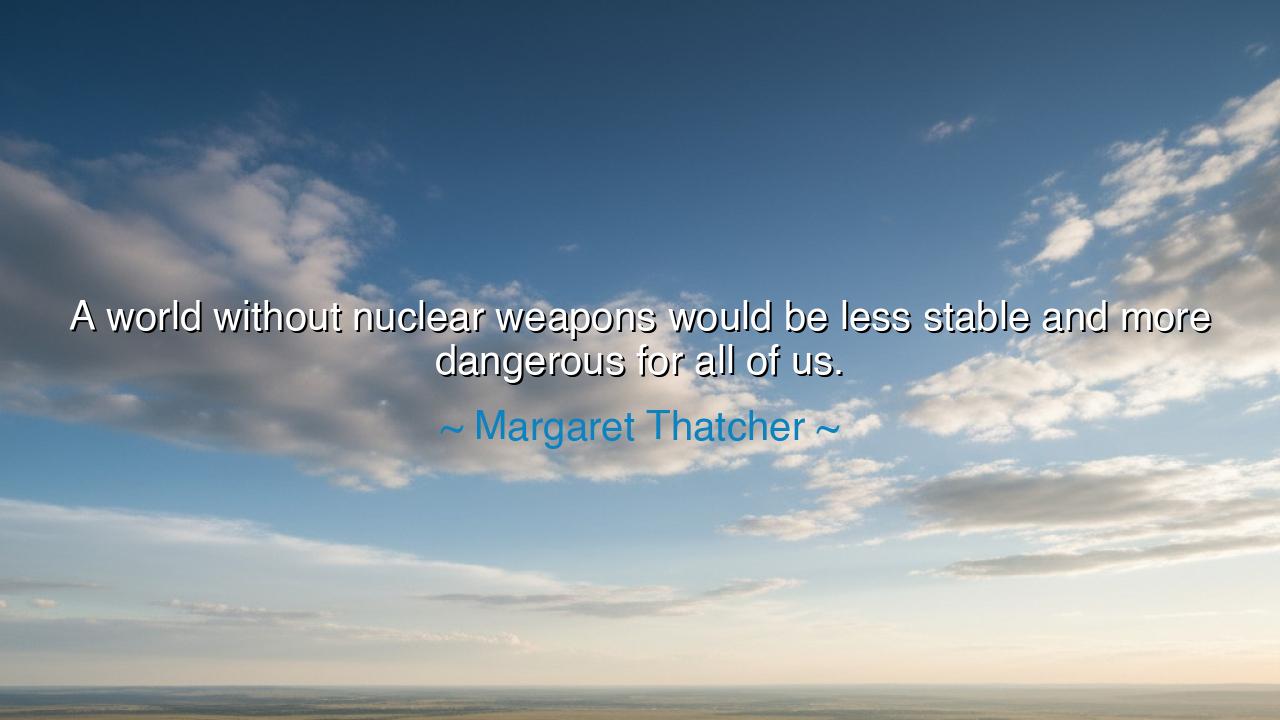
A world without nuclear weapons would be less stable and more






"A world without nuclear weapons would be less stable and more dangerous for all of us." – Margaret Thatcher
So spoke Margaret Thatcher, the Iron Lady of Britain — a leader forged in the crucible of the Cold War, whose words carried the weight of realism tempered by the fire of survival. When she declared, “A world without nuclear weapons would be less stable and more dangerous for all of us,” she voiced not a defense of destruction, but a paradox of peace — that sometimes, the instruments of fear become the guardians of restraint. To the unthinking ear, her words sound harsh, even cynical; yet beneath them lies an ancient wisdom: true peace is not the absence of power, but the balance of it.
The origin of this quote lies in the tense decades of the late twentieth century, when the world stood divided between two titanic forces — the United States and the Soviet Union — each armed with nuclear might capable of ending civilization itself. Thatcher, serving as Britain’s Prime Minister during this perilous age, understood that humanity was living on a knife’s edge. Yet she also understood something deeper: that this edge, dreadful as it was, enforced a kind of discipline among nations. The knowledge that any first strike could bring mutual annihilation kept the world in a terrible but enduring state of caution. Thus, paradoxically, nuclear weapons — symbols of death — had become instruments of deterrence and stability.
This was the philosophy of nuclear deterrence, known in the grim language of the age as Mutually Assured Destruction. It was a doctrine not born of hope, but of fear — yet fear, rightly understood, has often been the teacher of wisdom. Thatcher did not celebrate these weapons; she feared them deeply. But she also feared something more — a world where no balance of power existed, where aggression might again awaken, as it had before the great wars. To her, nuclear disarmament without trust, without verification, without the maturity of nations, was not peace, but peril disguised as virtue.
History itself bears witness to her reasoning. Before the nuclear age, the world was no stranger to catastrophe. The twentieth century began with empires unchecked, alliances brittle, and weapons unleashed in endless escalation. Twice, in a span of thirty years, civilization devoured itself in world wars born of arrogance and miscalculation. But after Hiroshima and Nagasaki, the world paused — horrified by its own power. It was as if Prometheus had given man the fire of the gods, and with it came fear enough to humble ambition. Thatcher’s generation saw that the terror of destruction could teach restraint, and restraint, though imperfect, could preserve the world.
Yet her words are not merely political; they carry moral weight. She reminds us that the tools of destruction, once created, cannot simply be wished away. Humanity cannot undo its knowledge; it can only discipline it. The ancient masters taught that a sword, once forged, must be held with honor — never out of wrath, but out of duty. Likewise, the nuclear sword must be guarded, not brandished; it must inspire vigilance, not arrogance. Thatcher’s wisdom was the wisdom of the realist — that peace is not maintained by good intentions alone, but by the steadfast recognition of human frailty and power’s peril.
In her eyes, the danger of a world without nuclear weapons was not only that nations would rearm in secret, but that human nature, still restless and ambitious, would find new ways to dominate. To disarm without changing the heart of man, she feared, was to create a false Eden — one where envy and mistrust would soon return, only without the deterrent that had kept war at bay. Her statement was thus a call not for blind faith, but for mature vigilance — for peace grounded in realism, not illusion.
So, my child of the future, take this lesson from the Iron Lady’s paradox: strength and peace must walk together. To seek peace without power is to invite danger; to seek power without conscience is to invite ruin. The balance lies in wisdom — the courage to hold the sword but not unsheathe it, the humility to fear one’s own strength. Let her words remind you that safety is not found in ignorance or denial, but in the discipline of responsibility. The world may never be free from danger, but it may yet remain free from destruction, if those who hold power remember, as Thatcher did, that the greatest victory of all is restraint.






AAdministratorAdministrator
Welcome, honored guests. Please leave a comment, we will respond soon